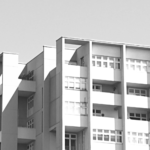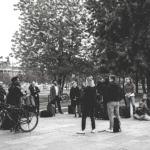Trip Journal by Andrea Jonas, Friedrich Paulsen and Francesca Weber-Newth
In October 2021, the New Urban Progress fellows went on a delegation trip through three German cities. In this Trip Journal, three fellows draw on their experiences made on Monday, October 19, which began at the site of the former Tempelhof Airport.
How does a typical Berlin field-trip-day start, if not with a morning walk across the city’s most famous green space? We started our Monday at Tempelhofer Feld, the Airport runway-turned-park. This vast green oasis — a radically bare space that was opened as a park in 2014 as the result of a referendum — was a perfect match with our topic of the day: transformation processes and the city of the future. Despite the referendum’s legal implications (a law that prevents any building on the space), it seems that the park is once again a political playball, with a renewed public debate about whether housing should be built on its perimeter.
The walk took us to CityLAB Berlin, a project of the Technologie Stiftung Berlin, which aims to bring together administration and civil society via innovative tech, a participative and open approach. New Urban Progress fellow Tori Boeck was our host and gave us a comprehensive overview of CityLAB’s mission, structure and projects. It was inspiring to hear how the Lab approaches climate change in creative ways, using open government data. Tori introduced us to the project “Gieß dein Kiez” [Water your neighbourhood], which encourages citizens to collaboratively water local trees, according to various factors such as rainfall. As we ate our lasagna at Orville’s Cafe & Aperitivo Bar, we asked ourselves: if all of the data that the state produces were open, what projects could be developed to make the city more equitable? But equally, what might be the risks of publishing data? Tori made a convincing argument that datasets should always be contextualised, not published carelessly without sufficient framing — agreed!
A city within the city
Next stop — only a few meters around the corner — the Besucherzentrum CHECK-IN at Tempelhof Airport. After an introduction on the role of the state-owned development company Tempelhof Projekt GmbH and an overview of public participation by New Urban Progress fellow Francesca Weber-Newth, the guided tour began. The scale of the airport building (“a city within the city”), its endless corridors, staircases and tarmac apron are enough to make anyone feel overwhelmed — the development is clearly a generational task that is both costly and intertwined with politics. It was refreshing that the American fellows asked why the former airport building cannot be demolished in order to keep the costs down (maybe just keeping the facade as a nod to heritage protection). A question that seems well outside the scope of discussions about the future of the building within the German context. In these moments of frank discussion and re-framing, the value of the transatlantic exchange becomes undeniable! The Tempelhof tour ended with a visit to Floating University, situated in a rain retention basin of the airport. A wooden wonderland built on stilts, this project stands out for bringing together questions of ecology and architecture in a creative way.
Third stop: Kottbusser Tor (aka “Kotti”) and the topic of housing. After drinking a fresh ayran, obligatory when in this part of town, a volunteer from the renters’ association Kotti & Co, public housing management official Ulrike Hamann, and Berlin’s state secretary of housing Wenke Christoph gave us a tour and talked to us about transformation processes that can be seen in the housing market. While Berlin was an affordable city in the 1990s and the early 2000s, the city then turned into an attractive market for international real estate companies and start-ups. With a growing population there was increasing pressure on the housing market. We learned that social housing stock often has a sell-by-date; after 30 years, private developers are able to raise rents again and are not subject to government regulation, which has left Berlin with a significant problem in recent years.
The potential for protest and direct democracy surprised our US colleagues
While the Senate Department for Urban Development and Housing is trying to address the challenge of affordable housing with various tools (such as rent control, eviction protection and by supporting development companies to increase building), activists are most excited about the recent successful referendum on nationalizing the private housing companies. Again, the transatlantic perspective was a welcome surprise: the potential of protest and direct democracy in the realm of housing came as a surprise to our US colleagues.
The day ended in a cosy Neukölln bar with Tagesspiegel journalists Madlen Haarbach and Corinna von Bodisco. Here we reflected on the role of local journalism in informing urbanites about their city, a necessary basis for participation and urban development processes based on the common good. By addressing citizens with new communication tools — such as newsletters or podcasts — these journalists are trying to actively involve citizens in debates on the city of the future.
By walking more than 20,000 steps through Berlin (!), we saw snapshots of Berlin’s future; a city within the city, new tools for a smart city and innovative housing instruments to keep the city livable for everyone.
About the authors
- Andrea Jonas is Project Manager for international urban development at the German Federal Institute for Research on Building, Urban Affairs and Spatial Development (BBSR).
- Friedrich Paulsen is Department Director of Governmental Affairs and Political Coordination at the German Association of Savings Banks.
- Francesca Weber-Newth is Project Manager at Tempelhof Projekt GmbH.
New Urban Progress is the joint metro initiative of Das Progressive Zentrum, the Alfred Herrhausen Gesellschaft and the Progressive Policy Institute.
The project is supported by the Transatlantic Program of the Federal Republic of Germany and funded by the European Recovery Program (ERP) of the Federal Ministry of Economics and Energy (BMWi).


